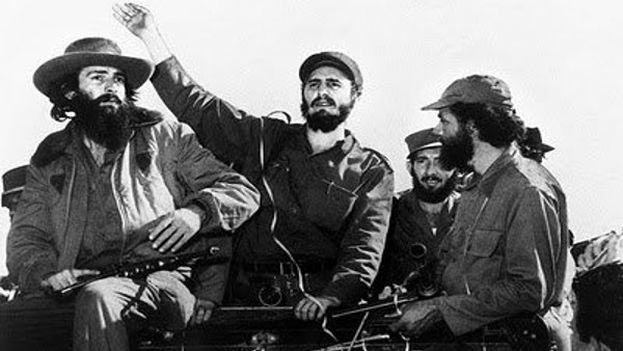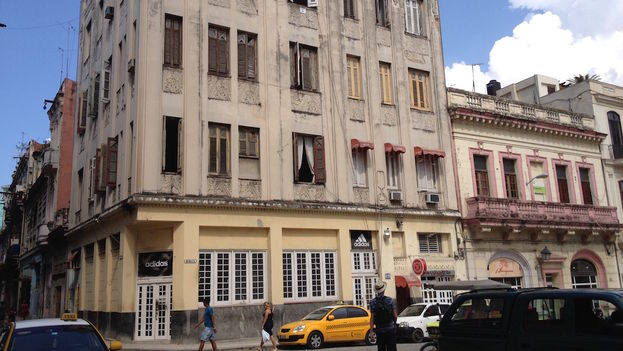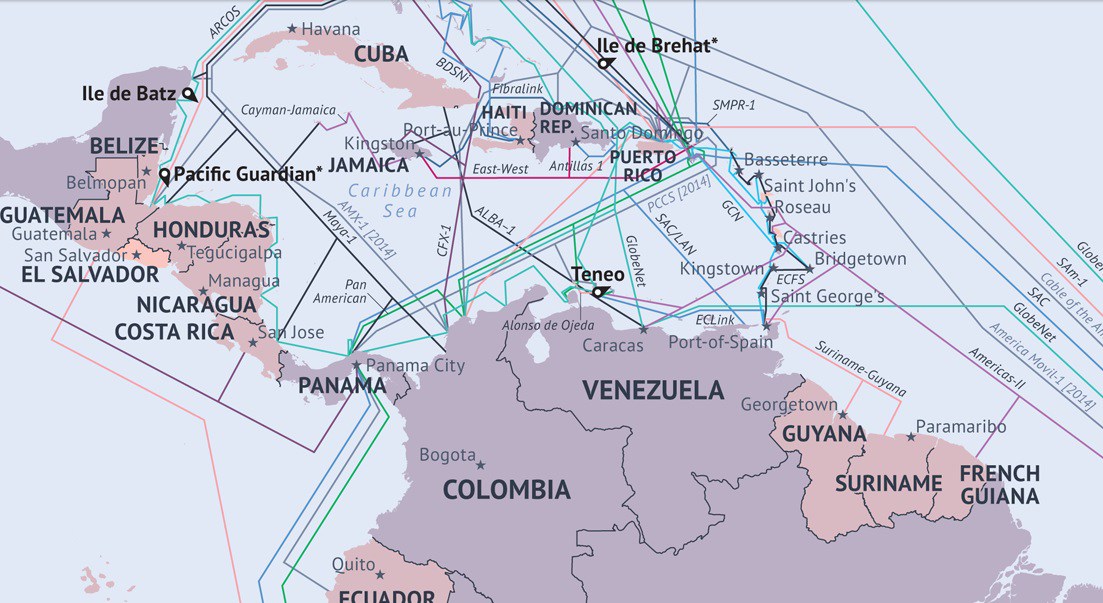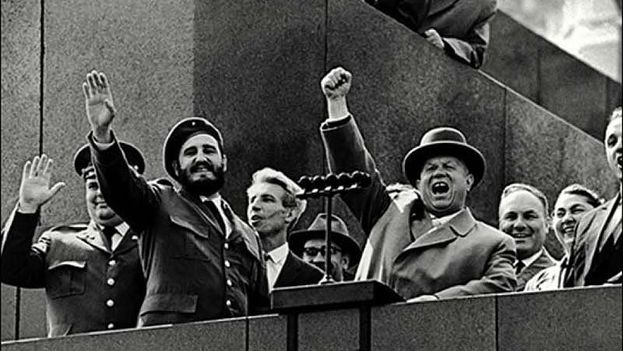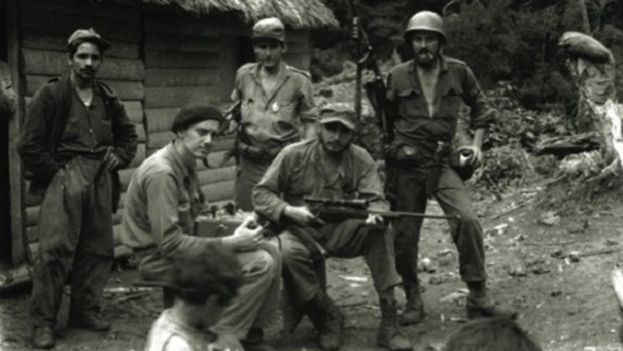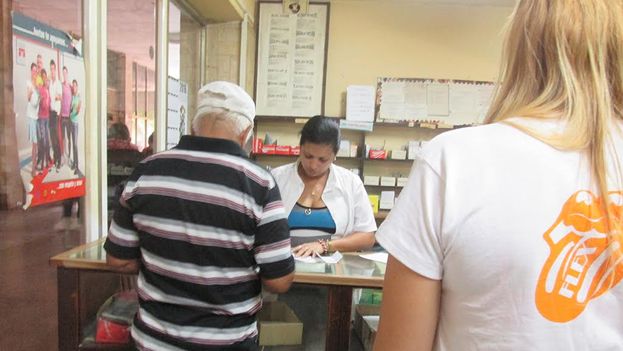
![]() 14ymedio, Regina Coyula, 28 June 2016 – Unless it’s for a purchase of contraceptives, the pharmacy generally comes through when someone nearby is ill or is being treated for a chronic illness. The pharmacies themselves do not raise one’s spirits. Many are poorly lit or poorly ventilated or in need of paint or all of the above. The workers’ initiative is “embellished” with decorative garlands of various kinds and informative murals with indecipherable writing. The medications are arranged according to use, with each group in a little cardboard box in which the inventory is carried.
14ymedio, Regina Coyula, 28 June 2016 – Unless it’s for a purchase of contraceptives, the pharmacy generally comes through when someone nearby is ill or is being treated for a chronic illness. The pharmacies themselves do not raise one’s spirits. Many are poorly lit or poorly ventilated or in need of paint or all of the above. The workers’ initiative is “embellished” with decorative garlands of various kinds and informative murals with indecipherable writing. The medications are arranged according to use, with each group in a little cardboard box in which the inventory is carried.
If you decide to put together a home first aid kid, be patient and visit the pharmacy assiduously to gather the basics. For the most part, medications are subsidized by the state. This does not prevent an aging couple with chronic conditions (don’t forget the aging of the Cuban population) from spending on medications the full retirement pension of at least one of them. continue reading
There are medications that do not require a prescription, among which are the “artisanal” and “green” medications for a cough or such like, but they are not always there when you need them. Others are dispensed by prescription and controlled by the “Tarjetón” – your ration card for medications.
The Tarjetón is a piece of cardboard that each patient receives, where medications and other health supplements whose monthly sales are regulated are recorded. The doctor gives you a certificate valid for one year, stamped with her seal with her name and both surnames and her practice registration number. Despite these unique data for each physician, there is still one unavoidable step missing, the seal of the healthcare institution. After standing in line (there is almost always a line), the “stamp issuer,” who is not a doctors nor has a list, nor writes on a computer, nor makes notes on paper, stamps the seal and continues to the next. With this paper, in the pharmacy nearest to your home among the 2,141 in the country, you get in line, deliver the certificate, show your identity card, register, and receive the Tarjetón.
Despite such rigor, it may be at the time of purchase, that the medications have run out, have arrived incomplete, or are “missing.” For insulin-dependent diabetics the Tarjetón controls disposable syringes. It says right on the packaging “sterile insulin syringe for single use,” but the patient only receives between two and five syringes a month. If you complain, the clerk peevishly tells you that this disposable “isn’t really” and you can reuse it and even boil it and nothing will happen.
When the medication on your Tarjetón is “missing,” which is not uncommon (data in the press from last year shows that this is the case, on average, for 40 medications a week), you have to see a doctor for a substitute. If the medication only needs a prescription it is simpler; if it needs the Tarjetón the process starts again, even if it’s a temporary certificate.
But there are items that have no substitute, such as colostomy bags. In that case, the pharmacy employee shakes his head sorrowfully, and advises you to solve the problem immediately by talking with the doctor at your hospital, but to look for a safe way, while accompanying the counsel with a wave of the hand in the air which alludes to very far distances, because the supply of the bags is usually very unstable.
Regardless if the difficulties are their own or others, if they have it or not, the purchase cannot be made retroactively and experience dictates that one should not leave it to the last days of the month because things run out. This largely explains the existence of an active black market.
To locate a drug that is not in your pharmacy assures hatred of the line. The employee is obliged to locate it, and the phone used for this is delayed because it is busy on the other end, or they don’t answer, or they don’t have it either. If the search is crowned with success, they will give you a paper (yes, it’s the Tarjetón), which reserves the medication for you, but not for 8 hours, nor for 16 or 24 hours, but only up to midnight of the same day.
If a lifelong treatment combines medications on the Tarjetón with other prescriptions, the patient is required to regularly go to their neighborhood doctor to wait for the prescription that completes their treatment. The staff shrug their shoulders and raise their eyebrows when asked why these drugs are not included on the Tarjetón.
I have left for dessert the issue of the sanitary pads received by women between ages 14 and 55. Outside this range women must document early menarche or late menopause. Fertile women must bring, in addition to their ID card, the ration book for food where their receipt of these items is marked; the book will show an item called a “torpedo,” a form that registers the monthly packet of ten sanitary pads, responsible for one of the most painful events that must be coped with.
Do not despair. There is always the appeal in extremis to spending Cuban convertible pesos [known as CUCs, each one worth about a dollar or one-twentieth of the average monthly wage] in clean, bright and air-conditioned hard currency-pharmacies, where there is no queuing or prescription required.


